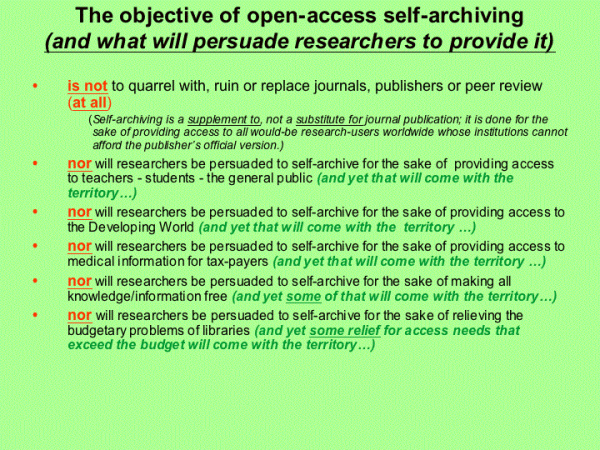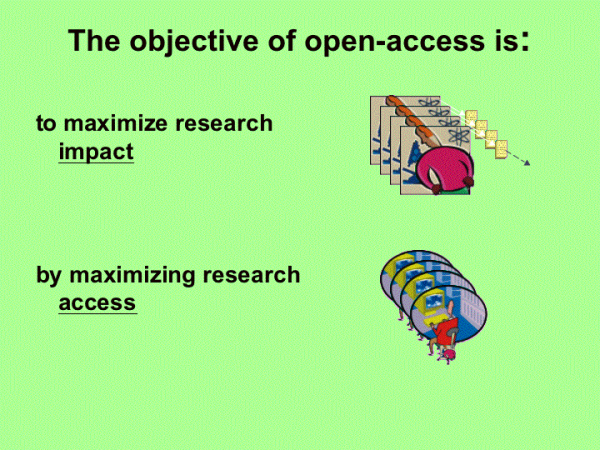
Dr. Ian Gibson has written the
foreword to Neil Jacobs (ed.),
Open Access: Key strategic, technical and economic aspects, Chandos Publishing, forthcoming 2006.
A scientist and British MP, Ian Gibson's role in the Open Access (OA) movement has been a remarkable one, and he will certainly get the historic credit for having shepherded-through the landmark
UK Parliamentary Select Committee on Science and Technology's recommendation to mandate OA self-archiving.
Historians and sociologists of science will find it especially interesting that Ian has done what he has done despite the fact that much of his admirable populist rationale for OA will prove to have been completely wide of the functional mark (though perhaps not of the practical, political mark).
In the PostGutenberg Era, OA will be seen clearly to have been a research community objective and a research community benefit, in making findings accessible to all researchers who need to use them, not just to those whose institutions can afford the journal in which they happen to have been published (as in the Gutenberg Era). OA may or may not eventually lead to publishing reform, but in and of itself it will become clear that OA was not and would not have been provided by researchers merely or primarily in order to reform publishing, nor in order to make journals more affordable. It will have been provided
by researchers
for researchers because that is what research and researchers need and want, and the Web has at last made it possible for them to give and get it.
The idea that OA is needed in order to break journal publishers' "
monopoly" may hence prove to have been one of OA's actual intermediate selling points, in inspiring indignation and action, but it will also prove to have been a specious point.
Missing the mark too is the notion that OA is needed to feed a "hungry" public with the content of peer-reviewed research journals. Apart from a few small and non-representative fields, such as clinically relevant biomedical research and possibly some areas of applied science and social science research, there is not only no hunger but no appetite on the part of the general public for reading the mostly specialised and esoteric peer-reviewed research literature, written by specialised researchers, for specialised researchers with the expertise to understand and use it (2.5 million articles per year, across all research fields, in 24,000 peer-reviewed journals). It is through researchers using, building upon and applying the fruits of research that the general public benefits from OA, not through reading it through for themselves.
Developing-world access on the part of developing-world
researchers (rather than the general public) is of course part of the rationale for OA, but let us not imagine that OA is merely or mainly an act of charity! There are just as many "needy" would-be users among researchers in the developed world as in the developing world, insofar as the research literature is concerned, because no researcher's institution anywhere can afford all the journals that could contain articles that any researcher might ever need, and, a fortiori, none can afford all the peer-reviewed journals there are (24K). And this would still be true (please note carefully!)
even if all journals were sold at cost (zero profit, hence no point blaming monopolists and price-gougers).
And Ian is even off the mark insofar as "free-riding" is concerned. His own committee's (spot-on)
recommendation was that
all researchers should be required to self-archive their own published research article output in their own institutional repositories, free for all. Publishers have filled Ian's ears, no doubt, with apocalyptic alarms about the possibility of rival publishers free-riding on and underselling that free content: Utter nonsense, because based on a
profound misunderstanding of the Web, of OA itself, and of what comes with the territory:
For if/when all articles are available free for all on the web, it is absurd to imagine that any free-riding rival publisher will be able to
sell them, to anyone! On the contrary (and somewhat incoherently), the original publishers have also raised alarms about whether they themselves will continue to be able to sell them, under competition from their own author's free versions. All
evidence to date is that they can and will; but if/when the subscription/license market should ever shrink to a non-sustainable level, there can and will be a natural adaptive
transition to OA publishing -- but not before; and there's no sign on the horizon of anything like that yet.
But having said all that: Neither Ian nor OA enthusiasts (or detractors) seem to be aware of or deterred by such inconsistencies. So let them keep fighting for (or against) OA on the grounds of journal affordability, public accessibility, or what have you, if they like. Just as long it is Ian's own remedy that the proponents promote: mandated self-archiving in the researcher's own IR.
For those who are actually in a position to mandate self-archiving, however -- namely, researchers' own institutions and their research funders -- it might be helpful if we gave them a more compelling and face-valid reason for mandating OA than merely to fight publisher monopolies or to feed peer-reviewed research information to a hungry general populace: OA self-archiving
dramatically enhances the uptake and usage -- and hence the productivity and progress -- of research itself, and that is what pays researchers' salaries, funds their research, and provides the
return on the tax-payer's investment in research. OA is optimal (hence inevitable) for research. It is also already well overdue, having been reachable for well over a decade now. That's why we need the self-archiving mandates, at long last.
Stevan Harnad


 Dr. Ian Gibson has written the
Dr. Ian Gibson has written the 



